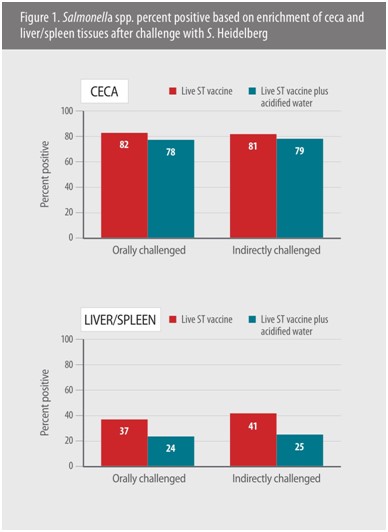
Source: PoultryHealthToday.com
Acidified drinking water did not impair the efficacy of a live Salmonella Typhimurium (ST) vaccine in broilers challenged with Salmonella Heidelberg, according to Manuel Da Costa, DVM, PhD, associate director, outcomes research, Zoetis.
Vaccinating broilers with a live ST vaccine is a strategy producers use to reduce the level of Salmonella spp. at processing. Some producers also acidify the water the first several days of life to reduce the load and early colonization of Salmonella spp., he explained.
Da Costa and colleagues wanted to determine if water acidification might interfere with live ST vaccination. They started with 360 broilers that were spray-vaccinated with a live ST vaccine at hatch. Next, they divided the birds into two isolation rooms, each with two pens.
Within each room, one pen received water acidified with a sulfuric acid product for the first 12 days, and birds in the other the other pen did not. The target pH for acidified water was 3.3.
Vaccine take tested
At 3 and 6 days of age, the investigators randomly selected 10 birds from each pen and obtained cecal swabs, which they had tested for vaccine take by real-time polymerase chain reaction specific for the vaccine.
At 13 days of age, all birds in the study received a booster dose of the live Salmonella vaccine by oral gavage. Then at 28 days of age, about half of the birds per pen were orally challenged with Salmonella Heidelberg. The remaining, unvaccinated birds in each pen were indirectly exposed to the challenge pathogen by mingling with the challenged birds, Da Costa said.
At 38 days of age, cecal and liver/spleen samples from all remaining birds were tested for Salmonella spp (prevalence evaluated by enrichment and loads evaluated by most probable numbers – MPN). The investigators also boot-swabbed for Salmonella spp. enumeration in all four pens.
Overall, Salmonella loads were negligible and there were no statistical differences in Salmonella recovery between the birds that did and did not receive acidified water nor between birds that were directly challenged and those indirectly challenged by mingling with challenged birds (Figure 1), he said.
“When we looked at the results post-challenge, it was interesting to observe that the overall load of Salmonella was very low,” Da Costa said. Just one of 470 samples was positive on MPN testing (direct plating) for Salmonella, even though colonization rates of the challenge using selective enrichment was high. In addition, all boot-swab samples were negative for Salmonella, he said.
Da Costa acknowledged that the low load of Salmonella spp. cannot be completely attributed to the vaccine since the study did not have a true, unvaccinated control group, but he concluded that the results indicate acidification of water during the first 12 days of life at a pH of 3.3 did not appear to interfere with the activity of the live ST vaccine.
All trademarks are the property of Zoetis Services LLC or a related company or a licensor unless otherwise noted.








